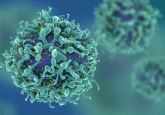Rates of microRNA methylation: a new biomarker for cancer?

In a recent study, researchers from Osaka University (Japan) have identified a new way to distinguish individuals with early pancreatic cancer from healthy controls by measuring the methylation rate of microRNA (miRNA). These findings may improve early-stage cancer diagnosis with the potential to improve patient outcomes.
It is well established that miRNAs exhibit abnormal expression in cancerous tissue and have been used successfully as a cancer biomarker. However, previously the methylation state of the miRNA has not been considered and the associated assumptions have led to a lack of sensitivity and accuracy in the technique.
The research team at Osaka University aimed to address these shortcomings by investigating whether methylation is an indicator of abnormal miRNA function. In the study, scientists measured the miRNA methylation levels in serum samples from patients with pancreatic cancer and healthy controls to ascertain whether levels of methylated RNA are elevated or not in cancer cells.
The results of the study, published recently in Nature Communications, revealed that methylated miRNA was found in significant levels in serum samples from pancreatic patients. Compared with the control group, where methylated miRNA was found at trace levels or absent completely. The researchers also found that, when compared with established biomarkers such as carbohydrate antigen 19-9, evaluating miRNA methylation showed better performance in detecting early-stage pancreatic cancer.
The beneficial effect of early detection and cancer treatment on patient outcome is well documented and a new biomarker with high sensitivity could be vitally important.
As well as utilising RNA methylation as a biomarker, understanding the role RNA methylation plays in cancer cells may lead to new therapies. Jun Koseki, co-lead author (Osaka University), concluded: “clarifying the mechanisms by which methylation regulates miRNA function throughout the different stages of cancer may facilitate the development of targeted therapies, leading to improved patient outcomes.”
Sources: Konno M, Koseki J, Asai A et al. Distinct methylation levels of mature microRNAs in gastrointestinal cancers. Nat. Commun. 10(1), 3888 (2019); https://medicalxpress.com/news/2019-09-methylation-microrna-powerful-biomarker-cancer.html






